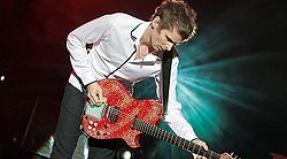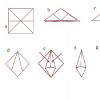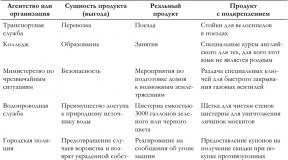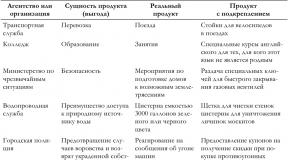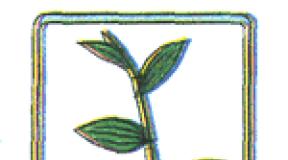Who is the creator of the theory of the political elite. The concept of the political elite. Classical and modern theories of elites. Classical theories of the elite
1. The emergence of the concept and theory of elites
1.1. The origin of the concept of "political elite"
The word "elite" in translation from French means "the best", "selected", "chosen". In everyday language, it has two meanings. The first of them reflects the possession of some intensely, clearly and most pronounced features, the highest on a particular scale of measurements. In this sense, the term "elite" is used in such phrases as "elite grain", "elite horses", "sports elite", "elite troops", "thieves' elite", etc.
In the second sense, the word "elite" refers to the best, the most valuable group for society, standing above the masses and called upon by virtue of possessing special qualities to control them. This understanding of the word reflected the reality of a slave-owning and feudal society, the elite of which was the aristocracy. (The very term "aristos" means "the best", respectively, the aristocracy - "the rule of the best.")
In political science, the term "elite" is used only in the first, ethically neutral meaning. Defined in the most general form, this concept characterizes the carriers of the most pronounced political and managerial qualities and functions. The theory of elites seeks to exclude leveling, averaging in assessing the influence of people on power, reflects the unevenness of its distribution in society, competition and competition in the field of political life, its hierarchy and dynamism.
The scientific use of the category “political elite” is based on well-defined general ideas about the place “role of politics and its direct carriers in society. The theory of the political elite proceeds from the equality and equivalence or even priority of politics in relation to the economy and social structure of society. Therefore, this concept is incompatible with the ideas of economic and social determinism, represented, in particular, by Marxism, which interprets politics as just a superstructure over the economic basis, as a concentrated expression of economics and class interests. Because of this, and also due to the reluctance of the ruling nomenklatura elite to be an object of scientific research, the concept of the political elite in Soviet social science was viewed as pseudoscientific and bourgeois-tendentious and was not used in a positive sense.
Initially in political science, the French term "elite" became widespread at the beginning of the 20th century. thanks to the works of Sorel and Pareto, although the ideas of political elitism arose outside France in ancient times. Even during the decay of the tribal system, views appear that divide society into higher and lower, noble and rabble, aristocracy and common people. These ideas were most consistently substantiated and expressed by Confucius, Plato, Machiavelli, Carlyle, Nietzsche. However, such elite theories have not yet received any serious sociological substantiation. The first modern, classical concepts of elites emerged in late XIX - the beginning of the XX century. They are associated with the names of Gaetano Mosca, Vilfredo Pareto and Robert Michels.
1.2. Mosca's elite theory .
The outstanding Italian sociologist and political scientist Mosca (1858-1941) tried to prove the inevitable division of any society into two groups unequal in social status and role. In 1896, in his Fundamentals of Political Science, he wrote: “In all societies, from the most averagely developed and barely attaining the rudiments of civilization to the enlightened and powerful, there are two classes of persons: the class of managers and the class of the ruled. The first, always relatively small in number, performs all political functions, monopolizes power and enjoys its inherent advantages, while the second, more numerous, is governed and regulated by the first.<...> and supplies him<...> material means of support necessary for the viability of the political organism ”.
Mosca analyzed the problem of the formation of the political elite and its specific qualities. He believed that the most important criterion for entering it is the ability to control other people, i.e. organizational ability, as well as material, moral and intellectual superiority that distinguishes the elite from the rest of society. Although, on the whole, this stratum is the most capable of managing, however, not all of its representatives are inherent in the best, higher qualities in relation to the rest of the population.
Noting the cohesion of the group of managers and its dominant position in society, Mosca called it a political class. This class is subject to gradual change. There are two trends in its development: aristocratic and democratic. The first of them is manifested in the desire of the political class to become hereditary, if not legally, then in fact. The predominance of the aristocratic tendency leads to the "closure and crystallization" of the class, to its degeneration and, as a consequence, to social stagnation. This, ultimately, entails an intensification of the struggle of new social forces for the occupation of dominant positions in society.
The second, the democratic tendency is expressed in the renewal of the political class at the expense of the most capable of managing and active lower strata. Such renewal prevents the degeneration of the elite and makes it capable of effectively leading society. A balance between aristocratic and democratic tendencies is most desirable for society, because it ensures both continuity and stability in the country's leadership and its qualitative renewal.
The concept of Mosca's political class, having had a great influence on the subsequent development of elite theories, was criticized for some absolutization of the political factor (belonging to the administrative layer) in the social structuring of society, for underestimating the role of the economy. In relation to a modern pluralistic society, this approach is largely inappropriate. However, the theory of the political class found unexpected confirmation in totalitarian states. Here politics acquired a dominant position over the economy and all other spheres of society, and in the person of the nomenklatura bureaucracy, the prototype of the “political" class "described by Moska was formed. ".
1.3. Pareto and Michels concepts .
Independently of Mosca, about the same time, the theory of political elites was developed by Pareto (1848-1923). He, like Mosca, proceeded from the fact that the world at all times should be ruled by an elected minority - an elite endowed with special qualities: psychological (innate) and social (acquired as a result of upbringing and education). In A Treatise on General Sociology, he wrote: "Whether some theorists like it or not, human society is heterogeneous and individuals are different physically, morally and intellectually." The totality of individuals, whose activities in one area or another are distinguished by efficiency, high results, and constitutes the elite.
It is divided into the ruling, directly or indirectly (but effectively) participating in management, and the non-ruling - the counter-elite - people who have qualities characteristic of the elite, but do not have access to leadership because of their social status and various kinds of barriers that exist in society for lower strata.
The ruling elite is internally united and is fighting to maintain its dominance. The development of society occurs through periodic changes, the circulation of two main types of elites - "foxes" (flexible leaders using "soft" methods of leadership: negotiations, concessions, flattery, persuasion, etc.) and "lions" (tough and decisive rulers, relying mainly on force).
Changes in society are gradually undermining the dominance of one of these types of elites. Thus, the rule of the "foxes", effective in relatively calm periods of history, becomes unsuitable in situations requiring decisive action and the use of violence. This leads to the growth of discontent in society and the strengthening of the counter-elite ("lions"), which, with the help of the mobilization of the masses, overthrows the ruling elite and establishes its rule.
R. Michels (1876-1936) made a major contribution to the development of the theory of political elites. He investigated the social mechanisms that give rise to the elitism of society. Mainly in solidarity with Moska in the interpretation of the reasons for elitism, Michels pays special attention to organizational skills, as well as organizational structures of society, which enhance elitism and raise the ruling stratum. He concluded that the very organization of society requires elitism and naturally reproduces it.
The "iron law of oligarchic tendencies" operates in society. Its essence lies in the fact that the development of large organizations, inseparable from social progress, inevitably leads to the oligarchization of social management and the formation of an elite, since the leadership of such associations cannot be carried out by all of their members. The effectiveness of their activities requires functional specialization and rationality, the allocation of a governing core and apparatus, which gradually but inevitably get out of the control of rank-and-file members, break away from them and subordinate politics to their own interests, and are primarily concerned with preserving their privileged position. Ordinary members of organizations are not competent enough, passive and show indifference to everyday political activities. As a result, any organization, even a democratic one, is always actually ruled by an oligarchic elite group. These most influential groups, interested in preserving their privileged position, establish various kinds of contacts among themselves, rally, forgetting about the interests of the masses.
From the operation of the "law of oligarchic tendencies" Michels drew pessimistic conclusions regarding the possibilities of democracy in general and the democracy of social democratic parties in particular. In fact, he equated democracy with the direct participation of the masses in government.
In the writings of Mosca, Pareto, and Michels, the concept of the political elite has already acquired a fairly clear outline. Its most important properties were outlined, parameters allowing to differentiate and evaluate various elite theoriesmodernity (these parameters will be used below). These include:
1) special properties inherent in representatives of the elite;
2) relationships that exist within the elite stratum and characterize the degree of its cohesion and integration;
3) the relationship of the elite with the non-elite, the mass;
4) recruiting the elite, that is, how and from whom it is formed;
5) the role (constructive or destructive) of the elite in society, its functions and influence.
2. The main directions of modern elite theory.
2.1. Machiavellian school
The concepts of the elites of Mosca, Pareto and Michels gave impetus to broad theoretical, and later (mainly after the Second World War) and empirical studies of the groups that led their state or those claiming it. Contemporary theories of elites are diverse. Historically, the first group of theories that have not lost their contemporary significance are the concepts of the Machiavellian school already briefly considered (Mosca, Pareto, Michels, etc.). They are united by the following ideas:
1. Special qualities of the elite associated with natural talents and upbringing and manifested in its ability to manage or at least to struggle for power.
2. Group cohesion of the elite. This is the cohesion of the group, united not only by a common professional status, social position and interests, but also by elite self-awareness, the perception of oneself as a special layer called upon to lead society.
3. Recognition of the elitism of any society, its inevitable division into a privileged ruling creative minority and a passive, non-creative majority. This division naturally follows from the natural nature of man and society. While the personal composition of the elite changes, its dominant attitudes toward the masses are fundamentally unchanged. So, for example, in the course of history, tribal leaders, monarchs, boyars and nobles, people's commissars and party secretaries, ministers and presidents were replaced, but the relations of domination and subordination between them and the common people have always been preserved.
4. Formation and replacement of elites during the struggle for power. Many people with high psychological and social qualities strive to occupy a dominant privileged position. However, no one wants to voluntarily cede their posts and positions to them. Therefore, a hidden or explicit struggle for a place under the sun is inevitable.
5. In general, a constructive, leading and dominant role of the elite in society. It performs a management function necessary for the social system, although not always effectively. In an effort to preserve and inherit its privileged position, the elite tends to degenerate, to lose its outstanding qualities.
Machiavellian theories of elites are criticized for exaggerating the importance of psychological factors, anti-democracy and underestimation of the abilities and activity of the masses, insufficient consideration of the evolution of society and modern realities welfare states, cynical attitude to the struggle for power. This criticism is largely justified.
2.2. Value theories
The value theories of the elite are trying to overcome the weaknesses of the Machiavellianists.They, like Machiavellian concepts, consider the elite the main constructive force of society, but soften their position in relation to democracy, seek to adapt the elite theory to real life modern states. Diverse value concepts of elites differ significantly in the degree of protection of aristocracy, attitude towards the masses, democracy, etc. However, they also have a number of the following general attitudes:
1. Belonging to the elite is determined by the possession of high abilities and indicators in the most important spheres of activity for the whole society. The elite is the most valuable element of the social system, focused on meeting its most important needs. In the course of development, many old ones die off and new needs, functions and value orientations arise. This leads to the gradual displacement of the carriers of the most important qualities for their time by new people who meet modern requirements. Thus, in the course of history, there was a change in the aristocracy, embodying moral qualities and, above all, honor, education and culture, by entrepreneurs, whose economic initiative society needed. The latter, in turn, are replaced by managers and intellectuals - bearers of knowledge and managerial competence so important for modern society.
2. The elite are relatively cohesive on the healthy basis of their leadership functions. This is not an association of people seeking to realize their selfish group interests, but the cooperation of persons who care primarily about the common good.
3. The relationship between the elite and the masses has not so much the character of political or social domination, but rather leadership, which presupposes managerial influence based on the consent and voluntary obedience of the governed and the authority of those in power. The leading role of the elite is likened to the leadership of the older, more knowledgeable and competent in relation to the younger, less knowledgeable and experienced. It is in the interests of all citizens.
4. The formation of the elite is not so much the result of a fierce struggle for power as a consequence natural selection society of the most valuable representatives. Therefore, society should strive to improve the mechanisms of such selection, to search for a rational, most efficient elite in all social strata.
5. Elitism is a condition for the effective functioning of any society. It is based on the natural division of managerial and executive labor, naturally follows from equality of opportunity and does not contradict democracy. Social equality should be understood as equality of life chances, and not equality of results, social status. Since people are not equal physically, intellectually, in their vital energy and activity, it is important for a democratic state to provide them with approximately the same starting conditions. They will come to the finish line at different times and with different ones. .results. Social “champions” and outsiders will inevitably appear.
Some supporters of the value theory of elites are trying to develop quantitative indicators that characterize its impact on society. So, N.A. Berdyaev, on the basis of an analysis of the development of different countries and peoples, derived the "elite coefficient" as the ratio of the highly intellectual part of the population to the total number of literate people. The elite ratio of over 5% means that society has a high development potential. As soon as this ratio dropped to about 1%, the empire ceased to exist, stagnation and ossification were observed in society. The very same elite turned into a caste, a priesthood.
Valuable ideas about the role of the elite in society are prevalent among modern neoconservatives, who argue that elitism is necessary for democracy. But the elite itself must serve as a moral example for other citizens and inspire respect for itself, confirmed in free elections.
2.3. Democratic elitism theories .
The main provisions of the value theory of elites underlie the concepts of democratic elitism (elite democracy), which have become widespread in modern world... They proceed from the understanding of democracy proposed by Joseph Schumpeter as a competition between potential leaders for the trust of voters. As Karl Mannheim wrote, “Democracy entails an anti-elitist tendency, but does not require to go all the way to the utopian equation of the elite and the masses. We understand that democracy is characterized not by the absence of an elite stratum, but rather by a new way of recruiting and a new identity of the elite. "
Supporters of democratic elitism, referring to the results of empirical studies, argue that real democracy needs both elites and mass political apathy, since too high political participation threatens the stability of democracy. Elites are needed, first of all, as a guarantor of a high-quality composition of leaders elected by the population. The very social value of democracy decisively depends on the quality of the elite. The leading stratum not only possesses the properties necessary for management, but serves as a defender of democratic values \u200b\u200band is able to restrain the political and ideological irrationalism, emotional instability and radicalism often inherent in the masses.
In the 60s and 70s. claims of comparative elite democracy and mass authoritarianism have been largely refuted by case studies. It turned out that although representatives of the elites usually surpass the lower strata of society in the adoption of liberal-democratic values \u200b\u200b(freedom of the individual, speech, competition, etc.), in political tolerance, tolerance for other people's opinions, in condemning the dictatorship, etc., but they are more conservative in recognizing the socio-economic rights of citizens: to work, strike, organize a trade union, social security, etc. In addition, some scholars (P. Bakhrakh, F. Nashold) have shown the possibility of increasing the stability and efficiency of the political system by expanding mass political participation.
2.4. Elite Pluralism Concepts
The attitudes of the value theory about the value-rational nature of the selection of elites in a modern democratic society develop the concepts of plurality, pluralism of elites, which are, perhaps, the most common in today's elite thought. They are often referred to as functional elite theories. They do not deny the elite theory as a whole, although they require a radical revision of a number of its fundamental, classtechnical installations. The pluralistic concept of the elite is based on the following postulates:
1. Interpretation of political elites as functional elites. Qualification preparedness to perform the functions of managing specific social processes is the most important quality that determines belonging to the elite. “Functional elites,” writes E. Holtmann, “are individuals or groups with special qualifications necessary to occupy certain leadership positions in society. Their superiority in relation to other members of society is manifested in the management of important political and social processes or in influencing them. "
2. Denial of the elite as a single privileged relatively cohesive group. In a modern democratic society, power is dispersed between various groups and institutions, which, through direct participation, pressure, the use of blocs and alliances, can veto undesirable decisions, defend their interests, and find compromises. The power relations themselves are changeable, fluid. They are created for specific decisions and can be replaced to make and implement other decisions. This weakens the concentration of power and prevents the stable ruling layer from collapsing.
3. The division of society into the elite and the masses is relative, conditional and often blurred. Between them there is a relationship of representation rather than domination or permanent leadership. Through various democratic mechanisms - elections, referenda, polls, press, pressure groups, etc. - it is possible to limit or even prevent the action of the "law of oligarchic tendencies" formulated by Michels and keep the elite under the influence of the masses. This is facilitated by the competition of elites, which reflects the economic and social competition in modern society. It prevents the formation of a single dominant leadership group and makes it possible for the elites to be accountable to the masses.
4. In modern democracies, elites are formed from the most competent and interested citizens, who are very free to be part of the elite and participate in decision-making. The main subject of political life is not the elite but interest groups. The differences between the elite and the masses are based mainly on the unequal interest in decision-making. Access to the management layer is opened not only by wealth and high social status, but above all by personal abilities, knowledge, activity, etc.
5. In democracies, elites perform important social functions related to governance. Talking about their social domination is wrong.
2.5. Left-liberal concepts
A kind of ideological antipode of pluralist elitism is left-wing liberal theories of the elite. The most important representative of this trend, Charles Wright Mills, back in the 50s. tried to prove that the United States is ruled not by many, but by one ruling elite. Left-liberal elitism, sharing some of the provisions of the Machiavellian school, has specific, distinctive features:
1. The main elite-forming feature is not outstanding individual qualities, but the possession of command positions, leadership positions. The ruling elite, Mills writes, “is made up of people in positions that enable them to rise above the common people and make decisions that have major consequences.<...> This is due to the fact that they command the most important hierarchical institutions and organizations of modern society.<...> They occupy strategic command posts in the social system, in which effective means are concentrated that provide power, wealth and fame that they use. " It is the occupation of key positions in economics, politics, military and other institutions that provides power and thereby constitutes the elite. This understanding of the elite distinguishes left-liberal concepts from Machiavellian and other theories that derive elitism from the special qualities of people.
2. Group cohesion and diversity in the composition of the ruling elite, which is not limited to the political elite, which directly makes government decisions, but also includes corporate leaders, politicians, senior civil servants and senior officers. They are supported by intellectuals who have settled well within the existing system.
The rallying factor of the ruling elite is not only the common interest of its constituent groups in preserving their privileged position and the social system that ensures it, but also the proximity of social status, educational and cultural level, circle of interests and spiritual values, lifestyle, as well as personal and family ties.
3. The deep difference between the elite and the masses. Natives of the people can enter the elite only by taking high positions in the social hierarchy. However, they have little real chance of doing this. The ability of the masses to influence the elite through elections and other democratic institutions is very limited. With the help of money, knowledge, a well-established mechanism for manipulating consciousness, the ruling elite controls the masses virtually uncontrollably.
4. The recruiting of the elite is carried out mainly from their own environment based on the acceptance of its socio-political values. The most important selection criteria are the possession of resources of influence, as well as business qualities and a conformist social position.
5. The primary function of the ruling elite in society is to ensure its own domination. It is to this function that the solution of managerial tasks is subordinated. Mills denies the inevitability of elitism in society, criticizes it from a consistently democratic position.
Supporters of the left-liberal elite theory usually deny a direct connection between the economic elite and political leaders, whose actions, according to Ralph Miliband, for example, are not determined by the big owners. However, the political leaders of the countries of developed capitalism agree with the basic principles of the market system and see it as the optimal form for modern society. social organization... Therefore, in their activities, they strive to guarantee the stability of a social system based on private property and pluralistic democracy.
In Western political science, the main provisions of the left-liberal concept of the elite are sharply criticized, especially the assertions about the closeness of the ruling elite, the direct entry of big business into it, etc. In the Marxist literature, on the contrary, this direction was assessed very positively due to its critical orientation.
3. Typology, social performance and elite recruiting.
3.1. General definition and reasons for the existence of an elite
Each of the main directions of the elite theory considered above reflects certain aspects of reality, focuses on certain historical epochs and countries. The most important features and aspects of the elite highlighted in them allow us to give its general definition. Political eliteis a constituent minority of society, an internally differentiated, heterogeneous, but relatively integrated group of people (or a set of groups), to a greater or lesser extent possessing the qualities of leadership and prepared to perform managerial functions, occupying leading positions in public institutions and (or) directly influencing the adoption power decisions in society. This is a relatively privileged, politically dominant group, claiming to represent the people in a democratic society and to one degree or another controlled by the masses and relatively open to any citizen with the necessary qualifications and political activity.
Its existence is due to the action of the following main factors:
1. psychological and social inequality of people, their unequal abilities, opportunities and desire to participate in politics;
2. the law of the division of labor, which requires professional employment in managerial work as a condition for its effectiveness;
3. high social significance of managerial work and its appropriate incentives;
4. wide possibilities of using managerial activity to obtain social privileges (since political and managerial work is directly related to the distribution of values);
5. the practical impossibility of exercising comprehensive control over political leaders;
6. the political passivity of the broad masses of the population, whose main interests usually lie outside politics.
3.2. Typology of elites
These and some other factors determine the elitism of society. The political elite itself is heterogeneous, internally differentiated and significantly different at different historical stages and in different countries... This, as well as the specificity of research approaches, complicates its classification.
Depending on the sources of influence, the elites are divided into hereditary, for example aristocracy, value - persons holding highly prestigious and influential public and state positions, imperious - direct holders of power and functional - professional managers who have the qualifications necessary for taking managerial positions.
Among the elites are distinguished the rulingdirectly holding state power, and opposition (counter elite); about openrecruited from the community, and closedreproduced from their own environment, for example, the nobility.
The elite itself is divided into the highest and average... The upper elite directly influences the decision-making that is significant for the entire state. Belonging to it can be due to reputation, for example, unofficial advisers to the president, his "kitchen cabinet", or position in the power structures. In Western democracies, there are about 50 members of the upper elite for every million inhabitants. Among the highest elite, a nucleus is often distinguished, characterized by a special intensity of communication and interaction and usually numbering 200-400 people.
The middle elite includes about 5 percent of the population, which stands out simultaneously on three grounds - income, professional status and education. Individuals with the highest scores on only one or two of these criteria are classified as marginal elite. As Karl Deutsch notes, “In general, people whose educational level is much higher than their income are usually more critical of existing attitudes, and tend to be centrism or left-wing radicalism in their political convictions. Persons whose income significantly exceeds the level of education are also often dissatisfied with their position, prestige and, as a rule, occupy the right political positions... Thus, the views of 5 percent of the country's adult population, which make up the elite of society, determined by the ratio of income, professional status and educational level, can tell a lot about what is politically acceptable and what is not acceptable for a given country. "
Many political scientists note a tendency for the role of the middle elite, especially its new strata, called the “subelite,” - top officials, managers, scientists, engineers and intellectuals - to play an increasing role in the preparation, adoption and implementation of political decisions. These strata usually surpass the upper elite in awareness, organization and ability to act together.
The elite adjoins the political elite directly involved in the political decision-making process administrative, intended for performing activities, but in fact has a great influence on politics.
One of the fairly meaningful classifications of the political elite in a democratic society is the selection, depending on the degree of development and the ratio of vertical (social representativeness) and horizontal (intra-group cohesion) ties of the elite, of its four main types: stable democratic (“Etched”) elite - high representativeness and high group integration; pluralistic - high representativeness and low group integration; domineering- low representativeness and high group integration, and disintegrated - both indicators are low (see table).
|
Social representativeness |
|||
|
high |
low |
||
|
Group integration |
high |
stable democratic |
domineering |
|
low |
Pluralistic |
Disintegrated |
|
A stable democratic elite that combines close connection with the people with a high degree of group cooperation, which makes it possible to understand political opponents and find compromise solutions acceptable to all.
3.3. Elite performance and integration .
The elitism of modern society is a fairly proven fact. Any attempts to eliminate it and political leveling of the population led only to the domination of despotic, ineffective elites, which ultimately harmed the entire people. Eliminating political elitism is possible only through social self-government. However, at the current stage of development human civilization self-government of the people is an attractive ideal rather than a reality. For a democratic state, it is not the fight against elitism that is of paramount importance, but the formation of the most effective elite useful for society, ensuring its social representation, timely qualitative renewal, preventing the trend of oligarchization, turning into a closed dominant privileged caste.
The social performance of the elite, which characterizes the effectiveness of its performance of the functions of leadership in society, is made up of many indicators. The most important of these are optimal combination of horizontal and vertical integration and effective recruitment systemensuring high professional competence and value orientations necessary for management personnel: honesty, respect for laws and human rights, concern for the common good, etc.
Horizontal integration is the cooperation of various representatives of the elite, its group cohesion. Kept within certain limits, it acts as a necessary condition for making collective decisions, protecting society from political polarization and radicalization, increasing the ability of leaders to find compromise solutions and reach consensus, and prevent and resolve conflicts. However, intragroup integration contributes to the social performance of the elite only when it does not occur due to the weakening of its social representativeness, which characterizes the expression of the interests of the whole society by the elite. As E. Hoffmann-Lange notes, modern "elites tend to emancipate from their own basis, the requirements of which they perceive as limiting their freedom of decision-making."
3.4. Social representativeness of the elite .
The expression of the needs and opinions of the population by the elite depends on many reasons. One of them is the social origin of its representatives. It greatly influences political orientations.
It is clear that it is easier for those who come from the environment of peasants, workers, certain ethnic and other groups to understand the specific needs of the corresponding strata, to find a common language with them. However, it is not at all necessary that the interests of workers be protected by workers, farmers by farmers, youth by youth, etc. This is often better done by professional politicians from other social groups.
In modern states, the disproportionality of representation in the elite of the population is quite large. Thus, among the elite of Western countries, university graduates are much more widely represented than other groups. And this, in turn, is usually associated with a fairly high social status of the parents. On the whole, however, the disproportionate representation of various strata in the political elite usually grows as the status of the office rises. On the first floors of the political and administrative pyramid, the lower strata of the population are much more represented than in the higher echelons of power. Disproportionate social indicators of the political elites and the entire population does not mean that the political orientations of the leaders are unrepresentative.
More important, in comparison with the formal representation-elite of the social structure, the guarantee of the social representativeness of the elite is its organizational (party, trade union, etc.) affiliation... It is directly related to the value orientations of people. In addition, parties and other organizations usually have ample opportunity to influence their members in the right direction.
In a modern democratic society, party control mechanisms over elites are complemented by state and public institutions. Such institutions include elections, media, opinion polls, pressure groups, etc.
3.5. Elite Recruitment Systems .
The systems of its recruitment (selection) have a great influence on the social representativeness, qualitative composition, professional competence and performance of the elite as a whole. Such systems determine: who, how and from whom makes the selection, what are its order and criteria, the circle of the selector (persons carrying out the selection) and the incentives for its actions.
There are two main systems for recruiting elites: guilds and entrepreneurial (entrepreneurial). In their pure form, they are quite rare. The entrepreneurial system prevails in democratic states, the guild system prevails in the countries of administrative socialism, although its elements are widespread in the West, especially in the economy and public administration.
Each of these systems has its own specific features. So, the guild system is characterized by:
1) closeness, selection of applicants for higher posts mainly from the lower strata of the elite itself, a slow, gradual way up. An example of this is the complex bureaucratic ladder, which implies gradual advancement along the numerous steps of the service hierarchy;
2) a high degree of institutionalization of the selection process, the presence of numerous institutional filters - formal requirements for holding positions. This can be party membership, age, work experience, education, leadership characteristics, etc .;
3) a small, relatively closed circle of the electorate. As a rule, it includes only members of the higher governing body or one first leader - the head of government, firms, etc .;
4) selection and appointment of personnel by a narrow circle of managers, lack of open competition;
5) the tendency to reproduction of the existing type of elite. In essence, this feature follows from the previous ones - the presence of numerous formal requirements, appointment to the position by top management, as well as the applicant's long stay in the ranks of this organization.
Entrepreneurial the elite recruiting system is in many ways the opposite of the guild system. It is distinguished by: 1) openness, ample opportunities for representatives of any social groups to claim to occupy leading positions; 2) a small number of formal requirements, institutional filters; 3) a wide range of electorate, which may include all voters in the country; 4) high competitiveness of selection, severity of rivalry for occupying leading positions; 5) the variability of the composition of the elite, the primary importance for this of personal qualities, individual activity, the ability to find support from a wide audience, to captivate it with attractive ideas and programs.
This system values \u200b\u200boutstanding people more. It is open to young leaders and innovations. At the same time, certain disadvantages of its use are the relatively high likelihood of risk and lack of professionalism in politics, the relatively weak predictability of politics, and the tendency of leaders to be overly enthusiastic about external effects. On the whole, as practice shows, the entrepreneurial system for recruiting elites is well adapted to the dynamism of modern life.
The guild system also has its pros and cons. Among its strengths are the balance of decisions, a lower degree of risk in their adoption and less likelihood of internal conflicts, greater predictability of policy. The main values \u200b\u200bof this system are consensus, harmony and continuity. At the same time, the guild system is prone to bureaucracy, organizational routine, conservatism, arbitrariness of the electorate and the substitution of informal ones for formal selection criteria. It engenders mass conformity and makes it difficult to correct mistakes and eliminate shortcomings at the initiative of the bottom. Without the addition of competitive mechanisms, this system leads to a gradual degeneration of the elite, its separation from society and transformation into a privileged caste.
3.6. The nomenclature system and its social consequences
In fact, this is what happened in the countries of administrative socialism, where for many decades the nomenklatura system of recruiting the political elite dominated - one of the most typical variants of the guild system. The essence of the nomenklatura system consists in the appointment of persons to all socially significant leadership positions only with the consent and recommendation of the relevant party bodies, in the selection of the elite from above.
In the USSR, for example, negative social consequences the functioning of this system was strengthened by its all-encompassing nature, the complete elimination of competitive mechanisms in economics and politics, as well as the ideologization, politicization and non-promotion (dominance of family ties) of selection criteria. Such criteria were complete ideological and political conformism ("political maturity"), partisanship, personal loyalty to higher leadership, servility and sycophancy, family ties, ostentatious activism, etc. These and other similar norms - filters weed out the most honest and capable people, disfigured the personality, gave rise to a mass type of gray, ideologically notorious worker, incapable of genuine initiative, who sees only personal benefit in occupying leadership positions.
The long-term destructive impact of the nomenklatura system, as well as the destruction in wars and camps of the color of the people, its best representatives, led to the degeneration of the Soviet political elite. The situation did not change after the liquidation of the power of the CPSU, since in Russia, unlike in many countries of Eastern Europe, no influential, truly democratic counter-elite capable of effectively leading society was formed.
The nomenklatura past, aggravated by the almost complete absence of social control and the mores of the legalized dealers of the shadow economy, was clearly manifested in the post-communist Russian elite. Her low business and moral qualities to a large extent explain the persistence and depth of the crisis in Russian society in the last decade, the massive spread of corruption and irresponsibility. A way out of this situation, successful reforming of society is possible only by creating a new system for recruiting elites based on competitive principles and institutionalizing the requirements for the business and moral qualities of political and administrative leaders.
The very weak political activity of citizens, the low performance of the Russian elite, the incompleteness of the process of recruiting a new leadership layer and, at the same time, its paramount importance for the transformation of the country - all this makes the problem of the political elite especially urgent for Russian society. The social mechanisms of its recruitment directly affect not only the social role and appearance of this group as a whole, but also determine the typical features of its individual representatives - political leaders.
Literature
Ashin G.K. Elitology. - M., 1995.
Gaman-Golutvina O.V. Political elites of Russia. - M., 1998.
Mills R.I. The ruling elite. - M., 1959.
Narta M. The theory of elites and politics. - M., 1978.
E.V. Okhotskiy Political elite and Russian reality. - M., 1996.
Foundations of Political Science. Ed. V.P. Pugacheva. - M., 1993.
A.V. Ponedelkov Political elite: genesis and problems of its formation in Russia. - Rostov n / a., 1995.
Pugachev V.P., Soloviev A.I. Introduction to Political Science. - M., 2000.
Soloviev A.I. Political Science: Political Theory, Political Technology. - M., 2000.
POLITICAL ELITES
The political elite is a special group of people with a privileged position in the structures of political-state and political-non-state power and directly performing the function of managing power relations.The political elite includes people who have political power in state and party institutions. They, as a rule, are engaged in the development of the concept of the activities of their institutions, they lead.
Plato divided society into three strata: the philosophical super-elite, the ruling elite, and the masses. But the first classical theories of elites were formed only at the beginning of the 19th century. G. Moskoy, V. Pareto and R. Michels. All of them viewed society as a unity of a relatively small privileged class of managers and the majority of those who are governed. The criteria for belonging to the elite can be: organizational skills, intellectual or material superiority, special individual qualities, etc. Generally, sociological theories that use the term "elite" can be divided into two groups. The first call the elite the layer located at the very top of the social pyramid (Mosca, Lasswell). The second, elite, mean those people who deserve to be at the top of society (Ortega y Gasset, Toynbee). Pareto applies to both groups at the same time. He believed that society is in equilibrium if the majority of those who are part of the ruling elite have certain qualities - whether good or bad from the point of view of morality - that provide them with power.
There are two reasons for the emergence and existence of the political elite of society. First, the need to govern society gives rise to the existence of an elite. Secondly, the egocentricity of human nature (taking care of oneself and one's loved ones) distinguishes the elite class.
Already in the early 1920s. sociologists adhering to an elitist approach pointed out the impracticability of the task set by the Bolsheviks of building a classless society in Russia. The class struggle, in their opinion, should have ended not with the dictatorship of the proletariat, but with the rule of those who speak on behalf of the proletariat, that is, the privileged minority, the elite.
Political elite concept
The political elite is a relatively small stratum of people (a kind of governing class) that occupies leading positions in government bodies, political parties, public organizations, etc. and influencing the development and implementation of policy in the country.
Basically, these are high-ranking professional politicians, senior civil servants, authoritative members of society, capable of influencing the solution of political problems. The political elite is divided into the ruling (which directly possesses state power), the opposition (i.e. the counter-elite), the higher (which makes decisions that are significant for the whole society), etc.
The existence of the political elite is due to the following factors:
1) psychological and social characteristics of people, their unequal abilities, capabilities and desire to participate in politics;
2) the law of the division of labor, which requires professional management, a certain specialization;
3) high social significance of managerial work and its corresponding incentives;
4) wide opportunities for the use of managerial activity to obtain social privileges (because it is directly related to the distribution of values);
5) the practical impossibility of exercising comprehensive control over political leaders;
6) the political passivity of the broad masses of the population, whose main interests usually lie outside politics.
It is no coincidence that the political elite was endowed with power: it is a social group that consists of individuals with certain abilities, professional knowledge, skills, and abilities that are most applicable in political activity. So the political elite is the central link government controlled, on whose activities the direction and course of the political development of society, the functioning of the political system depend.
Functions of the political elite:
1) strategic (defining a political program of action by generating new ideas that reflect the interests of society, classes, strata, etc.);
2) organizational (implementation in practice of the developed course, the implementation of political decisions in life);
3) integrative (strengthening the stability and unity of society).
The theory of the political elite
Political science is characterized by the recognition of the elitism of the existing society. Real political power is concentrated in the hands of the minority - the elite, who form the goals of society's development and make important political decisions.
Currently, there are a large number of different concepts that substantiate the legitimacy of dividing society into a governing minority and a governed majority.
Ideas about the inevitability of such a division of society were expressed in ancient times. In this regard, one can name Confucius, Plato, Machiavelli, although at that time no serious sociological substantiation was made.
The first scientifically developed concepts of elites were proposed in the late 19th - early 20th centuries. G. Mosca, V. Pareto, R. Michels. Their research describes the main qualities of the elite, the criteria and forms of selection, relationships within the elite and the relationship of the elite with the masses, the role of the elite in society. They emphasized the elitism of any society, its inevitable division into a ruling minority and a ruled majority. Power belongs to the elite because it has special qualities.
Currently, there are various areas of elite theories: value theories of the elite, theories of democratic elitism, the concept of pluralism of elites, left-liberal theories. They reflect certain aspects of reality.
In a generalized form, the political elite is a privileged group that occupies leading positions in power structures and is directly involved in making decisions that are most important for society. The ruling elite is an integral part of the political elite. It is usually subdivided into: the highest one, which makes the most important decisions for the entire state; medium, personifying the power structures of large regions; lower, administrative, represented by employees-managers.
The structure and social representation of the political elite are fickle. The changes taking place in society have a great impact on the composition of the elite.
In the preparation of the political elite, a huge role belongs to parties that nominate political leaders from their midst who are capable of defending the interests of certain social groups.
Introduction
The question of who really exercises power - the people, the leader, the party or the elite - was extremely important for understanding the logic of the political process. Figuratively, politics can be imagined as a theater on the stage of which actors act. The meaning of certain characters on the stage is different: some actors play a major role, others a secondary role, and still others are engaged in crowd scenes. The adoption of strategic decisions for society depends on certain groups and politicians, while others are ordered only to fulfill political directives, and the third, i.e. the majority of citizens are destined to obey the decisions made and carry them out (either voluntarily or under duress).
Making major political decisions is also a form of political action. The political practice of even developed and stable democratic societies shows that the process of distribution and implementation of power does not at all imply the equal participation of all citizens in it. Always and everywhere a narrow circle of people is involved in power - the ruling minority, which forces the masses to recognize themselves. Political inequality in any society was recognized as an inevitable reality, and democracy remained an illusion because it was not achievable. Consequently, in addition to economic, social, spiritual, there is also political inequality, due to the measure of participation in the exercise of power. The order in which political inequality is likely to be passed from one generation to the next, forming different political strata, is called political stratification. What is the basis of political inequality that determines the political dominance of some groups, individuals, organizations over others? Justification of the inevitability of the division of society into a ruling minority and a controlled majority is the subject of an independent section of the theory of politics - elitology, the content of which is a set of concepts of the elite, which differ in different interpretations of the nature of political inequality.
Classical theories of the elite
elite theory oligarchy mills
Initially, ideas about the legitimacy of dividing society into a minority dominating the rest of the population were expressed in antiquity. Thus, Confucius divided society into "noble men" (the ruling elite) and "low people" (commoners) on the basis of their observance of moral commandments. If the former follow the duty and the law, then the latter think about how to get a better job and get benefits. The former are demanding of themselves, the latter are demanding of people. Compliance with moral standards gives the right to govern. Confucius revealed the image of the ruling elite through the social qualities of its representatives: “A noble man in kindness is not wasteful; forcing to work, does not cause anger; not greedy in desires; throats are not in greatness; causing respect, it is not cruel. "
A different basis for dividing society into a ruling minority and an obeying majority is found in Plato, who associated political inequality with the quality of the soul inherent in certain groups of the population. The rational part of the soul, the virtue of which lies in wisdom, corresponds to the estate of rulers - philosophers (this is the elite); the furious part, the virtue of which is manifested in courage, is the class of warriors; the base, lustful part of the soul, mired in pleasures and joys, - the estate of farmers and artisans. The wise (i.e. the philosophers) must obey the worst part of the state. Moreover, Plato developed a system for the formation of the ruling elite: selection for the elite, upbringing and education of potential candidates.
However, the ideas about the inevitability of the division of society into managers and governed did not have a serious sociological basis and were based rather on various kinds of moral, religious, philosophical assumptions than on an analysis of the realities of political life. The scientific substantiation of the dependence of the effectiveness of political decisions taken on the quality of the ruling group is associated with the activities of representatives of the Machiavellian school of political sociology.
The creators of the concept of the elite, based on observing the real political behavior and interactions of the subjects of politics, were theorists of the Italian school of political sociology G. Mosca, V. Pareto, R. Michels, J. Sorel. This school is called Machiavellian, since it was N. Machiavelli, who singled out politics as an independent sphere of society, and began to consider it not as an area of \u200b\u200bthe imaginary, but as a political reality, as a practice. Observations of the facts of political life have revealed what is common to this concept of the elite: the consideration of the elite as a close-knit group, possessing exceptional qualities and realizing its superiority over all others. True, the understanding of the resources of the political domination of the minority over the majority of the population among the above representatives of the Italian school is different.
The doctrine of the "political class" G. Mosca
Professor, deputy, senator Gaetano Mosca (1854 - 1941) outlined his theory of the elite in the works "Foundations of Political Science" (1896 - 1923) and "History of Political Doctrines" (1933). It should be noted that to designate the elite, Mosca used definitions such as "political class", "ruling class", "ruling class or political class", "upper classes".
Mosca put forward the idea of \u200b\u200ba "ruling class" in his "Foundations of Political Science":
In all societies, from the most averagely developed and barely attained the rudiments of civilization to the enlightened and powerful, there are two classes of persons: the class of managers and the class of the ruled. The first, always small in number, carries out all political functions, monopolizes power and enjoys its inherent advantages, while the second, more numerous, is controlled and regulated by the first more or less legally, or more or less arbitrarily and violently, and supplies him with ... material the means of support necessary for the viability of the political organism.
Power can not be exercised by any person or all citizens at once. As the scientist believed, “political leadership in the broadest sense of the word, including ... administrative, military, religious, economic and moral leadership, is carried out in a special way, ie. an organized minority. " First of all, the minority rules the majority because they are organized. In addition, the ruling minority differs from the masses in its inherent special qualities.
Mosca carried out his analysis of the "political class" on the basis of an "organizational approach." Group cohesion and like-mindedness inherent in a political class are achieved due to its organization and structure. It is they who allow the ruling class to maintain power. The researcher noted that "the domination of an organized minority, obeying a single impulse, over an unorganized majority is inevitable ... These people acting in a coordinated and uniform manner will defeat a thousand people between whom there is no agreement."
The development of any society, regardless of the method of social and political organization, is directed by the ruling class. The ruling class itself is not homogeneous, it consists of two layers: a very small group of "top bosses" (something like a "superelite" within the elite) and a much larger group of "middle managers".
Access to a political class presupposes that individuals have special qualities and abilities. G. Mosca wrote:
Ruling minorities are formed in such a way that the individuals of which they are composed differ from the masses in certain qualities that give them a certain material, intellectual, or even moral superiority; in other words, they must have some necessary qualities that are highly valued and give weight in the society in which they live.
Obviously, these qualities can change during the evolution of human society. Thus, in primitive societies, military prowess was highly valued. With the development of civilization, the possession of wealth becomes the predominant quality. Mosca named three qualities that open access to the political class: military prowess, wealth, priesthood, with which three forms of aristocracy are associated - military, financial and ecclesiastical. Due to the immaturity of civilization as a whole, the scientist attaches less importance to scientific knowledge, the ability to apply it in practice. However, the dominant criterion for selection to a political class is the ability to govern, which presupposes knowledge of the national character and mentality of the people, and especially the experience of government.
As a developing organism, the political class needs its own renewal in order to meet the new requirements of the time. Mosca pointed out three ways to renew the ruling elite: inheritance, choice, and co-optation.
He noted two trends in the development of the ruling class: on the one hand, the desire of its representatives to make their functions and privileges hereditary, on the other hand, the desire of new forces to replace the old ones. If the first tendency (aristocratic) prevails, then the ruling class becomes closed, society's ability to develop is reduced, it stagnates. If the second tendency (democratic) dominates, then access to the ruling class is not difficult and it is rapidly renewed. But in this case, there is a danger of growing instability and political crises. Therefore, G. Mosca gave preference to that type of society, which is characterized by a certain balance between these two tendencies. A certain stability of the ruling class is necessary so that the penetration of new elements into it does not occur too quickly and is not significant in number. Mosca spoke little about co-optation (the volitional introduction of new members into the ruling class), although he considered it socially useful method.
The effectiveness of the performance of power functions by the ruling class largely depends on its organization, i.e. the nature of legislative measures and political and organizational procedures through which power is exercised and group cohesion is maintained. Depending on the principle of the transfer of political power, Mosca distinguished two types of political governance: autocratic and liberal. In the first case, power is transferred from the top down, and in the second, power is delegated from the bottom up. However, the scientist noted the possibility and combination of two types of political organization in representative boards, when the highest official is elected by universal suffrage, and then he appoints members of the government. An example of this practice is the United States, where a popularly elected president forms the government.
It should be noted that the theory of the ruling class, which was developed by Mosca, goes far beyond the framework of political problems per se, since according to this theory, the whole history of human society is nothing more than a process deliberately led by elites.
The psychological theory of the elite V. Pareto
A pragmatic orientation is also characteristic of the works of Vilfredo Pareto (1848 - 1923). “The history of mankind,” he noted, “is the history of a constant change of elites; some rise, others decline. " V. Pareto outlined the theory of elites in the "Treatise of General Sociology". In the context of the theory of the elite, he tried to identify the factors and prerequisites for the dynamic equilibrium of society and the importance in this process of political power, the motives of political behavior.
Pareto deduced the rationale for the role of the elite from the concept of social equilibrium, which society aspires to as a system. The state of equilibrium is provided by the interaction of many forces, called by the scientist elements. Of the four groups of elements (economic, social, political, intellectual), he paid special attention to the motivation of human activity.
The main motives of human activity and the driving forces of history are psychological stimuli, which he called "residua" (from Italian residua - remnants). They are reduced to biological instincts, to illogical, irrational feelings, emotions and represent the eternal and unchanging foundations of human activity, reflecting his individuality. In society, psychological stimuli are clothed in arbitrarily or consciously chosen forms of explanation for illogical behavior, which Pareto termed "derivations" (ie, doctrinal and theoretical statements in a political, social or religious context). Consequently, social equilibrium and the form of society are the result of the cumulative interaction of human feelings, expressed in "residence". That is why politics, according to Pareto, is to a large extent a function of psychology.
Using a psychological approach in the analysis of society and politics, the researcher explained the variety of social interests and statuses of psychological inequality of individuals. "Human society is not homogeneous," he noted, "and individuals differ physically, morally and intellectually." The totality of groups of individuals who operate with high performance in any area is called the elite. Consequently, Pareto defined the elite by its innate psychological properties: it consists of those who demonstrate outstanding qualities or have proven the highest abilities in the field of this activity. He emphasized:
The main idea of \u200b\u200bthe term "elite" is superiority ... In a broad sense, I mean by the elite a community of people who possess the properties of mind, character, dexterity, and the most diverse abilities to the highest degree.
Pareto even developed criteria for belonging to the elite, proposing for each sphere of human activity a system of indices (points) characterizing the abilities of individual individuals. The one who managed to acquire a million (honestly or dishonestly) is awarded 10 points, the one who achieved a fortune of several thousand lire - 6, the one who almost died of hunger - 1, and the one who got into the charity house of beggars - 0.
The “chosen class” (and this is translated as “elite”) is not homogeneous. The elite is divided into two parts: "ruling" and "non-ruling". Sometimes the terms “dominant group” are used within the “ruling elite”, which actually holds power, i.e. "Upper stratum" and "lower stratum" from which all elite groups are excluded. The “highest strata” are individuals who directly and effectively participate in management, while the “non-ruling elite” includes those who do not participate in making managerial decisions.
The governing class, relatively small in number, can maintain power partly by force and partly through the consent of the majority of the subordinate class. Essentially, the differences lie in the proportions of power and harmony. The resource of consent is based on the ability of the ruling class to convince the masses of their own righteousness. The likelihood of consent depends on the ability of the elite to be adept at manipulating feelings and emotions. As V. Pareto noted, "the more effective the government's policy is, the more successfully it uses emotions." However, the ability to persuade is sometimes not enough to maintain power. This means that the elite must be able to use force in time. Otherwise, a new elite will come instead, who will be able to do this.
Elites tend to decline, while non-elites are capable of producing potentially elite elements. This is due to the fact that belonging to the elite is not necessarily inherited: children may not possess all the outstanding qualities of their parents. There is a constant process of replacing old elites with new ones, who by origin come from the lower strata of society.
The need for such changes is due to the fact that the former elites "are losing their energy, there is a decrease in the proportions of the residency, which gave them the opportunity to conquer and retain power." Consequently, V. Pareto explained, all social transformations are determined by the “circulation of elites”, i.e. a system of "exchange" of people between two groups - the elite and the rest of the population. He emphasized:
This phenomenon of new elites, which, due to incessant circulation, rise from the lower strata of society to the upper strata, open up comprehensively, then decline, disappear and dissipate, is one of the main phenomena of history, and it must be taken into account in order to understand the main social movements.
The continuous circulation of elites contributes to the equilibrium of the social system to the extent that it provides an influx of the "best", "worthy". In addition, the circulation of the elites entails the circulation of ideas. However, this happens when the ruling class is open and understands the need for constant circulation. At the same time, when the elite is completely closed and turned into a caste, it loses its ability to rule and resorts to violence in order to maintain power. The lack of renewal and the influx of new forces generates dissatisfaction with the elite within society. Then the change of the elite is carried out with the help of the revolution. It upsets the social equilibrium of the existing system and forms a different configuration of social forces. A radical change of elites is taking place. So, the revolution of the end of the 18th century. in France was a consequence of the reluctance of the ruling class to ensure the circulation of the elites at the expense of the best representatives of the "third estate", which had no access to power.
R. Michels' concept of oligarchy
Robert Michels (1876 - 1936), who became one of the ideologues of fascism and a friend of Mussolini, proposed a different system of proof of the inevitability of the division of society into a ruling minority and a passive majority. He tried to prove the impossibility of implementing the principles of democracy in Western countries due to the immanent characteristics of the political organizations of these societies and "oligarchic tendencies" in mass political organizations (parties, trade unions). His main work, which examines the crisis of parliamentary democracy and justifies the legitimacy of elitism, is called Political Parties. Essay on the oligarchic tendencies of democracy ”(1911).
R. Michels explained the reasons for political stratification and impossibility of democracy by three tendencies that impede its implementation. They are embedded in the essence of a person, in the peculiarities of political struggle in the specifics of the development of organizations. These tendencies, according to Michels, contribute to the fact that democracy leads to oligarchy, turns into oligarchy.
The phenomenon of oligarchy, according to Michels, "is explained partly psychologically (psychology of the masses and psychology of organizations), partly organically (laws of structures, organizations)", with the main role played by factors of the first group. The behavior of the "ruling class" in a democracy is largely determined by the influence of the "masses" on the political process. Michels's concept of "masses" has a psychological content and is interpreted as a set of mental properties of a mass inhabitant: political indifference, incompetence, the need for leadership, a sense of gratitude to the leaders, the need to honor leaders, etc. The "masses" with such qualities are incapable of organizing themselves and independently managing affairs of society.
Among the groups claiming power within the framework of parliamentary democracy, the most effective are those that are able to secure support for their goals from the organized "masses". However, the very "principle of organization", which is a necessary condition for the leadership of the "masses", leads to the emergence of a hierarchy of power. Leadership of the organization presupposes the presence of professionally trained people from whom the apparatus is formed. It gives stability to the organization, but at the same time causes a degeneration of the organized "mass", completely changing places of leaders and the "mass".
The organization divides any party or trade union into a leading minority and a leading majority. The emerging "professional leadership" forcing the lower classes to recognize themselves is increasingly torn away from the "masses". In all organizations, leaders tend to oppose the rank and file, forming a more or less closed inner circle that usurps power. The sovereignty of the masses turns out to be illusory. This is how the "iron law of the oligarchy" works.
The oligarchic structure of power is based not only on the desire of the leaders to perpetuate themselves in power and to strengthen their own authority, but mainly on the inertia of the masses, who are ready to trust a few professional specialists, and on the technical properties of political organization.
The political elite itself is a product of the national psyche: the “elitist character of the nation” strives to be embodied in the ruling groups. In the structure of the "ruling class" R. Michels identified three independent elements, the interaction of which is conditioned by the needs of the exercise of domination - political, economic and intellectual. Each time, in certain historical conditions, real power is exercised by a "political-economic", "political-intellectual" or "strong-willed political class." The crisis of the institutions of parliamentary democracy in Italy and Germany in the 1920s brought to the fore the "strong-willed political class". The embodiment of the ideal of the "strong-willed class", according to R. Michels, was Italian fascism, headed by B. Mussolini.
Later, the concept of elitism found new supporters and critics. Opponents of the idea of \u200b\u200belitism pointed to its incompatibility with the ideas of democracy and self-government, criticized it for ignoring the independent role of the individual in politics, the ability of the masses to influence power, for excessive psychologism in interpreting the motives of political behavior and the foundations of political inequality in society. However, the followers of the concept of elitism deepened and developed the theories formulated by the classics, the main provisions in the new social conditions.
Contemporary theories of the elite
The rapidly developing scientific, technical and technological revolutions, access to education for the broad masses, a noticeable increase in the standard of living of the population in many countries of the world, the creation of effective mechanisms for ensuring the rights and freedoms of the individual, the increasing role of the media have created new realities in which political elites are formed and operate. These conditions have noticeably changed the foundations and ways of distributing political roles and functions, the factors of group cohesion of the elite, its perception of the world, and the resources that ensure its domination. These processes led to a variety of approaches used to study the real structure of power.
Elitist Approach and Elite Management Theory
The elitist approach continues the classic tradition of analyzing the elite as a relatively cohesive group exercising power functions. At the same time, considerable attention is paid to the heterogeneity of the elite, its structure, ways of influencing society. A number of authors still consider the elite as a group endowed with special qualities (social, political, psychological), knowledge, which allows it to make the most important political decisions.
For the first time the management theory of the elite was presented in the work of the American political scientist J. Bernheim "The Managers' Revolution" (1940). The radical changes in the political class, which he called a revolution, are associated with the emergence of a managerial elite (managers), which supplanted the class of capitalist-owners. The dominance of managers is due to the need for competent management of technically complex industries, focused on the diverse needs of various groups of the population. Organizational skills and knowledge of economic management predetermine a significant concentration of power in their hands. The political domination of the managerial elite, according to J. Bernheim, is based not on property or the ability to distribute resources (as, for example, among bankers), but on knowledge, education, and professional competence. Despite the high level of well-being, the main motive for their social activity is political power.
Similar ideas are substantiated by the founder of the concept of "postindustrial society" American sociologist D. Bell in the book "The Coming Postindustrial Society" (1973). In his opinion, the division into managers and governed in the information society was carried out on the basis of knowledge and competence. These qualities allow the new intellectual elite to make the greatest contribution to the development of society. The importance of intellectuals in the information society provides them with political power.
The Institutional Approach and Elite Theory of R. Mills
The institutional approach views the elite as a group of statuses and strategic roles.
In his work "The Ruling Elite," R. Mills defined the elite as "those who occupy positions of command." Since power in modern society is institutionalized, those who are at the head of social institutions occupy "commanding strategic posts in the social structure." In this case, a social institution is understood as a set of roles and statuses designed to meet a specific social need. Among the institutions the most significant for society, according to R. Mills, are political, economic and military. Those who lead these institutions make up the power elite. In practice, it is the triple elite, represented by the political leaders of the forefront, corporate leaders and the military leadership, who make the most important political decisions.
R. Mills explained: "By the power elite, we mean those political, economic and military circles that, in a complex interweaving of groupings, share the right to make decisions, at least of national importance." The power elite possesses group cohesion, conditioned by a community of interests and personal solidarity, resulting from a community of education, social origin, psychological kinship, the nature of interpersonal relations, lifestyle, etc.
Close relations of solidarity, mutual support and exchange are developing between the three institutions of power. This nature of relations is due to the coincidence of the objective interest of the military, political and economic departments in ensuring stability and progressive development of society as a whole. However, the social similarity and psychological commonality of people holding command posts in power structures are also important. That is why they can easily move from one structure (for example, political) to another (say, economic). But, as R. Mills noted, only the most influential people are among the politicians in the power elite. And since the center of decision-making in the United States has moved from Congress to presidential structures, the most influential are not the representatives of the people (legislators), but the political “appointees” nominated by the president. Political professionals who have gone through a large school of party work are being pushed aside by “appointees” who come from the economy and other spheres. As a result, Mills came to the conclusion that the elite is not a dominant group, formed on the basis of free elections, but an oligarchy made up of “presidential appointees.
Reputation approach and the concept of R. - J. Schwarzenberg
The reputational approach understands elite as a closed group, the status and activities of which are assessed by other groups in society, i.e. they define her reputation. Those over whom power is extended can determine, evaluate those who have real power. Consequently, reputation is determined in terms of the possibilities of influence of a given class and assessments of its social origin. These are the grounds for the selection of the elite formulated in the "Report on the ruling class of Italy" (1964) by J. Meino. The elite, which he called the "ruling class," is closed, recruited from wealthy families due to the strength of personal, informal ties between members of the ruling class, and has a high group cohesion. This oligarchy has great opportunities to influence all aspects of social life. She uses it to maintain her own favorable image among other groups. Within the ruling class, rivalry that could affect its own reputation is not allowed.
The reputation approach in the interpretation of the modern elite is used by the French political scientist R. - J. Schwarzenberg in his work "Absolute Right" (1981). He describes her as a closed caste. The "caste," or "new aristocracy," is a "triangle of power," made up of politicians, top management, and the business community. She absolutely controls power, forms the government, runs the state, runs large corporations and banks. The oligarchic nature of power, according to Schwarzenberg, stems from the fact that France does not adhere to the principle of separation of powers, therefore the elite is a single class, and not divided into parts of the leading groups. As a result, a close-knit and versatile elite was formed in the country, which monopolized power in the political, administrative and economic sectors. The ability to decisively influence various aspects of society's life is ensured not only by the concentration of strategic resources in the hands of the political elite and the ability to make important decisions, but also by maintaining the high reputation of the members of the elite.
The recruitment of members of the "new aristocracy" comes from the upper strata of society. They receive a prestigious, elite education. Career promotion also takes place on the basis of a well-thought-out scheme. The French political scientist noted that the political oligarchy relies on independent class recruitment, the main means of which are higher educational institutions and the highest echelons of power. The peculiarity of the political career of the "new aristocracy" is to advance without participation in general elections. First, immigrants from the "new aristocracy" occupy ministerial posts, chairs of corporations, and then, having achieved fame, fame, gaining connections in the highest echelons of power, they become holders of parliamentary mandates. However, most of the deputies are not included in the "power elite"; they are practically pushed out of the political decision-making process. Consequently, the political class is divided into two parts - a limited group of "top bosses" and a more numerous layer of "secondary bosses" (G. Mosca).
Pluralistic approach and the theory of plurality of elites (A. Bentley, R. Dahl, R. Aron, P. Sharan)
The essence of the theory of plurality, or pluralism of elites, is that the elite is no longer a monolithic entity, but a collection of cooperating or competing leadership groups. This is due to the growing variety of types of human activity that satisfy the constantly progressing needs of individuals and groups. This circumstance gives rise to the complication of the very structure of power.
American political scientist A. Bentley in his work "The Process of Governance" (1908) considered politics as a process of interaction of interest groups. In this process, strong groups dominate, subjugating and forcing the weaker ones to obey. Governance itself involves adaptation, conflict resolution, and balancing between rival groups. Bentley noted:
All phenomena of public administration are phenomena of groups pressing on each other, forming each other and singling out new groups and group representatives (government bodies or agencies) to mediate in a social agreement.
According to Benley, government institutions (constitution, congress, president, courts) represent and represent the interests of "formal groups." To "official groups", i.e. elite, he attributed legislative, administrative, executive judicial and legal institutions, the army and the police, the leading influence of which is provided by their ability to impose a solution to conflicts between individual groups and thus maintain political stability.
The regime under which there are many autonomous decision-making centers was called polyarchy by the American political scientist R. Dahl, and he characterized the political process in the United States with this term. In this model of power, no elite dominates. In the work "Who Rules?" (1961) Dahl considered politics in the context of the interaction of interested groups, the integration of which is based on the common values, goals, requirements. Stakeholder groups differ in their resilience according to the areas in which they have influence. However, political initiative and real political influence are not carried out by the group itself, but by its leader, relying on the support of a narrow circle of people. Social equilibrium grows out of free competition between rival groups within those limits that are established by general agreement. Its stability depends on the degree of heterogeneity of the society itself.
Industrial societies noticeably change the nature of the resources that serve as the basis for the political dominance of the elites. Previously, according to Dahl, political resources (money, wealth, status) were unevenly distributed and concentrated in the hands of one group - the aristocracy. An industrial society maintains political inequality, but disperses resources. In the context of a variety of social interests, public organizations emerge with varying degrees of autonomy. Political decisions then turn out to be the result of "endless negotiations" between opposing rival groups.
Some researchers found it possible to distinguish leading groups within the elite based on the delineation of their spheres of influence and resources used. Thus, R. Aron in his work "Social class, political class, ruling class" (1969) noted: "It is a mistake to imagine that modern societies are determined by one ruling class, while they are characterized by rivalry between ruling categories." In addition to the political elite, consisting of professionals - politicians and making the most important decisions, R. Aron identified five more "leading categories": (1) holders of "spiritual power" influencing the way of thinking and faith; he included priests, intellectuals, writers, scientists, and party ideologists among them; (2) military and police chiefs; (3) "team leaders", owners or managers of the means of production; (4) "leaders of the masses" (leaders of trade unions and political parties); (5) top-level functionaries, holders of "administrative power".
The structuring of the elite is carried out on the basis of a combination of various variables arranged according to the principle of complementarity - functions, the nature of the resources of political domination, the amount of power influence, specific indicators of the way of life (education, leisure, value system, lifestyle, etc.).
Indian political scientist P. Sharan in his book "Theory of Comparative Political Science" (1984) devoted a significant place to the analysis of elites. He drew attention to the fact that the maturity of society, the nature of cultural values \u200b\u200blargely determine the image of the elite, the resources of its domination and influence. On this basis, he singled out the traditional elite and the modern.
The resources of the rule of the traditional elite are religion, customs, traditions, cultural stereotypes, etc. Within the traditional elite P. Sharan distinguishes several "leading categories", the influence of which is different in traditional and pre-modern societies. Thus, the power of religious elites has noticeably weakened in the era of secularization of society. The only exception in Europe is the Vatican. The influence of religious elites is noticeable in the East (in particular, in Iran, in the countries of the Persian Gulf, etc.). The clan nobility (from leaders to royal families) lost their role even more. On the other hand, the influence of the military elite has noticeably increased, although it is heterogeneous in composition and value orientations. So, in Africa, the military represents the most educated and progressive-minded part of society, which cannot be said about the military in Latin America.
P. Sharan referred to the modern elite various social and professional groups - leaders, officials, intellectuals, businessmen, technocrats. According to the degree of influence on the process of making strategic decisions, he divided the modern elite into three groups: the upper, middle and administrative elites.
The upper elite are those who are directly involved or have a significant influence on the decision-making process. There are not so many of them, these are 100-200 people holding strategic positions in the government, major political parties, government groups, as well as legislators. The top elite is not homogeneous; within it, interest groups openly oppose each other. In democracies of the Western type, according to the political scientist, there are about 50 representatives of the upper elite for every million inhabitants, and in the United States, with a population of 200 million people, the circle of the upper elite numbers 10 thousand people.
The upper elite is followed by the middle elite, belonging to which is determined by three indicators - income level, professional status and education. The average elite is 5% of the adult population. In the absence of one or two necessary parameters, the potential candidate belongs to the “marginal” elite.
The administrative elite includes the upper stratum of civil servants who occupy leading positions in ministries, departments and other government bodies. The administrative elite also includes those highly educated managers who remain neutral and do not show their party sympathies.
Conclusion
It is obvious that the institution of the elite is an integral element of any civilized society. Complexly organized social systems have to deal with an ever-growing variety of interactions between groups, individuals, forms of human activity, both within the system and outside it. This leads to the selection of people who are professionally involved in management. Making the most important political decisions, they determine the ways of coordinating and representing the interests of various groups of the population, the forms of participation of the masses in social transformations. Therefore, it is legitimate to assume that elitism will continue in the foreseeable future. Moreover, attempts to combat the elitism of society are detrimental to society itself, since they are objectively directed against progress.
List of references
1. The theory of politics R.Т. Mukhaev; Moscow, 2005
2. Fundamentals of Political Science and Sociology V.S. Borovik, B.I. Kretov; Moscow, 2001
3. Sociology; edited by V.N. Lavrinenko, Moscow, 1998
4. Foundations of Sociology S.S. Frolov; Moscow, 1997
Tutoring
Need help exploring a topic?
Our experts will advise or provide tutoring services on topics of interest to you.
Send a request with the indication of the topic right now to find out about the possibility of obtaining advice
POLITICAL ELITE is an internally cohesive, minority social community that is the subject of preparation and adoption of the most important strategic decisions in the field of politics and has the necessary resource potential for this. It is characterized by the closeness of attitudes, stereotypes and norms of behavior, the unity (often, relative) of shared values, as well as involvement in power (regardless of the method and conditions of its acquisition). The resources used by the political elite are usually diverse and not necessarily political. To characterize the resource potential of political elites, it is effective to use the concept of multidimensional social space by P. Bourdieu. The most important characteristic of P.E. is a way to legitimize power, which determines the mechanisms for the development and adoption of political decisions, as well as the translation of the decisions made to the level of mass consciousness and behavior.
There are three main approaches to the procedure for identifying the political elite in the general elite structure of society: positional, which consists in determining the degree of political influence of a person on the basis of his position in the power system; reputational, based on the identification of the rating of a politician on the basis of information provided about him by other knowingly ruling persons; based on participation in making strategically important political decisions. The difference between the latter, according to which the political elite includes persons who make strategically important decisions, is that it is based not on the study of the phenomenon of political leadership (proceeding from the understanding of power as the ability to influence individuals, to determine their actions), but on the use of ideas about the nature of political power in society as an ability to influence decision-making.
As a certain system of views, the theory of the elite was developed at the beginning of the 20th century. V. Pareto, G. Moskoy, R. Michels. H. Ortega y Gasset, A. Toynbee, J.A. Schumpeter, K. Mannheim, C.R. Mills, G. Laswell, and others. From the position of G. Mosca, society, regardless of its socio-political structure, has always been divided into two classes: the dominant political class (monopolizing management functions) and the controlled class, the unorganized majority. In this scheme, the more numerous (in Western society) middle class acts as the foot and support of the ruling. At the same time, social stability is impossible without renewal of the elite.
It is possible to prevent the degeneration of the elite by renewing the political class. The corresponding processes are described using the concepts of the mechanisms and channels for recruiting the elite, which differ depending on the type of society. Within the framework of the modern political system, these channels include the state apparatus, local government bodies, political parties, the army, religious organizations, and the education system. The predominant importance of one channel or another is due to the historical traditions of political development, the peculiarities of the political system, the specifics of the political regime, etc. Possibilities of horizontal movement of members of the P.E. in the system of various recruiting channels are characterized by the concept of permeability of recruiting channels. The concepts of the personal composition and the qualitative composition of the political elite are also important. The principle of recruiting is in modern political science one of the most significant grounds for the typology of elites (according to K. Mannheim - selection by blood, by the principle of ownership and by the achieved success).
Another important category of elitology is the counter-elite. This concept includes persons who are not part of the power structures by status, but who have a significant impact on the adoption of strategic political decisions. The counter-elite is traditionally the top echelon of the political opposition.
Modern political science understands a political elite as a small, privileged group that possesses the qualities necessary for active political activity and has the ability to directly or indirectly influence the adoption and implementation of decisions related to the use of state power.
One of the founders of the theory of the political elite is the Italian scientist Gaetano Mosca. At the end of the 19th century, that is, during the formation of political science, G. Mosca was among those who made a significant contribution to this process. In 1885 he published a book entitled "Foundations of Political Science." In this work, later called "The Ruling Class", G. Mosca's political concept was set forth. According to this concept, society is always divided into two classes: the ruling class and the ruled class. The ruling class, although it constitutes a minority in any society, performs all the basic political functions, monopolizes power, and, consequently, the advantages that it gives. The ruled class, constituting the bulk of the population in any country, is, however, less organized and is subordinate to the ruling class, whose domination can be both legal and violent.
Mosca has not yet used the term "elite". Instead, he used the terms "ruling class" and "political class". At first, these terms were used as synonyms, but later the Italian scientist saw in the political class a part of the ruling class, whose activities are entirely related to issues of power and politics.
For G. Mosca, belonging to the political (ruling class) is determined by such characteristics as wealth, origin, attitude to the church hierarchy, personal qualities, including military prowess and mastery of the art of government. These characteristics were identified by the scientist based on the generalization of historical experience. Indeed, there are numerous examples indicating that success in the military field can become a springboard for a political career, moreover, open the way to the heights of power. This was the case, for example, in the 19th century with Napoleon, in the 20th century with General D. Eisenhower in the USA and Charles de Golem in France. The political history of Russia of the last decade also provides examples of the successful political career of former military personnel - B. Gromov, A. Lebed, and others.
At all times, material wealth opened the way to power, and today also any of the freest and most democratic elections cannot be won without material resources, especially money. According to Mosca, the birth factor plays an important role in the functioning of the ruling class. On the basis of historical research, he concluded that all peoples had a period when the ruling class consisted of a very limited number of families and was virtually closed. Every ruling minority sought to become hereditary, if not according to formal law, then in essence. Family and personal ties have always played an important role in the functioning of the ruling elite. Family upbringing contributes to the development of the qualities necessary to retain power. Representatives of the dominant minority are always more accessible a good education and a high level of professional training.
However, G. Mosca by no means absolutized the origin factor and did not believe that the representatives of the ruling elite have an innate superiority over the representatives of the middle and lower strata of society. Otherwise, as he pointed out, it would be difficult to explain the fact that these strata often leave people who, thanks to their mind, will and other personal qualities, are able to rise to the very heights of power, if the coincidence of favorable circumstances allows. The identification of closeness to the church hierarchy as one of the sources of political domination is explained not only by the fact that G. Mosca was an Italian, and in Italy religion and the church traditionally played an important role in public life, but also by the fact that the experience of many countries of the world testified to the great the influence of the religious factor on political life.
A necessary property of the ruling minority, according to Mosca, is its organization and ability to effectively exercise power over the unorganized majority. In this regard, the problem of effective management was of great interest to the scientist and was touched upon by him in his work "Foundations of Political Science". He discusses this issue in more detail in his work "History of Political Doctrines", where the art of government is defined as the main practical function of political science, and the implementation of this function is assigned to the political elite of society. It is in the hands of the political elite, Mosca argued, that despite all the talk about popular representation and democracy, power is.
G. Mosca saw two tendencies inherent in the ruling class, calling them aristocratic and democratic. The aristocratic tendency is manifested in the fact that the strata in power seek to consolidate their dominance and to transfer power by inheritance, if not de jure, then de facto. At the same time, according to Mosca, there is a "crystallization" of the ruling class, a certain stiffness of forms and methods of management, conservatism. The renewal of the ruling stratum is proceeding very slowly. The democratic tendency is observed when a society changes in the balance of political forces. The ruling class is replenished with the most capable of managing and active representatives of the lower strata of society. Mosca identifies three ways in which the ruling class consolidates and renews itself: inheritance, choice, and co-optation.
If the ruling stratum is practically not renewed, and new powerful political forces are ripening in society, then the process of its displacement by a new ruling minority begins. This happens as a result of political revolutions, the main function of which should be to replace the ineffective, degenerated ruling class with a new, more viable one. At this point, the views of G. Mosca almost completely coincide with the views of another Italian scientist Vilfredo Pareto. This coincidence has become the subject of discussion among scientists about the priority of their concepts. G. Mosca accused V. Pareto of plagiarism. According to modern researchers, this is not about plagiarism, but about the coincidence of conclusions reached by both thinkers independently.
Unlike Mosca, Pareto was already actively using the term "elite". In his understanding, the elite is a select part of society, to which all its individual members must adapt. Belonging to the elite is determined, first of all, by the personal biological and psychological qualities of a person. In general, the elite, according to V. Pareto, is characterized by a high degree of self-control and prudence, the ability to see the weak and most sensitive places in others and use them in their own interests. The masses, on the other hand, are characterized by an inability to cope with their emotions and prejudices. For the ruling elite, two basic qualities are especially necessary. First, the ability to persuade by manipulating human emotions; secondly, the ability to use force where it is required. The qualities of the first type are possessed by people whom Pareto, following Machiavelli, called "foxes." They are dominated by basic instincts, called by Pareto "the art of combinations", that is, the ability to maneuver, finding all sorts of options for getting out of emerging situations. The qualities of the second type are inherent in "lions", that is, people who are decisive, firm, even cruel, who do not stop before using violence. In different historical eras, ruling elites of different types are in demand. If the elite does not meet the requirements of the time, then it will inevitably collapse, therefore V. Pareto called the story “the cemetery of the aristocracy”.
Pareto's elite change mechanism is very similar to that described by Mosca. It looks like this: there is a constant circulation between the elite and the masses - the best representatives of the masses join the ranks of the elite, and that part of the elite that has lost the necessary qualities leaves its ranks. If the circulation process does not take place, the elite gradually degenerates. The worse the qualitative composition of the elite, the lower the effectiveness of its administrative activities, as a result of which the economic, social and political problems of society are aggravated. Since the elite is closed, those individuals who, according to their qualities, should be part of it, do not have such an opportunity. As a result, they unite in the opposition counter-elite, which claims to be in the power structures. Using the people's dissatisfaction with the policy of the existing government, the counter-elite attracts them to their side. To mobilize the masses to fight the ruling elite, the counter-elite relies on the ideological doctrines it develops. At a certain stage, in a situation of social crisis, it overthrows the ruling elite and comes to power on the wave of popular indignation. However, in the future, according to Pareto, everything will inevitably repeat itself. The new ruling elite is gradually acquiring an increasingly closed character and, ultimately, a revolutionary situation arises again with all the above-described consequences.
The third Italian sociologist who made a significant contribution to the development of the theory of elites at the turn of the 19th and 20th centuries was Robert Michels. He was a supporter of Marxist socialist ideas and initially believed in the ultimate triumph of the ideals of universal equality and social justice. In an effort to help the socialist movement in Italy, he attempted to study the experience of the most authoritative of the Marxist parties at the time, the Social Democratic Party of Germany. The conclusions that Michels made on the basis of the analysis done completely contradicted his initial ideas. The party, which declared its democratic character and proclaimed the ideals of social equality and justice, reproduced inequality in its own ranks. The party leadership is increasingly alienated from the bulk of party members and is trying to maintain and consolidate its privileged position.
As a result, Michels concludes that there is an “iron law of oligarchy”. Its essence boils down to the following: by virtue of the law of division of labor in large organizations (without which modern society is impossible), there is always a layer of managers. This layer is in the minority, but gains access to most of the resources. In the activities of the managerial stratum, there is a tendency to use these resources in their own interests, with a weakening of control on the part of the majority. This can be done, since the mass of the population in most cases is passive and inert, and, moreover, does not possess the qualities necessary for managerial activity. Gradually, the dominant minority turns into a closed oligarchic group, striving to make its privileged position hereditary, strengthening and protecting it in all possible ways.
Michels believed that the law he discovered was universal in nature and all arguments about equality were baseless. The democratic ideal is in principle unattainable and one should accept the inevitability of the rule of the elite majority.
The ideas of Mosca, Pareto and Michels were in many respects similar and together constituted the classical or, as it is also called, the Machiavellian concept of the elite. The main provisions of this concept are as follows:
- Society is always divided into a privileged, creative, ruling minority and a passive, non-creative majority. This division of society is naturally due to the natural nature of man and society.
- The elite have special psychological qualities. Belonging to it is associated with natural gifts and upbringing.
- The elite is characterized by group cohesion. It is united by a common social position, professional status and elite self-awareness, the idea of \u200b\u200bitself as a special social stratum called upon to lead society.
- The legitimacy of the elite, that is, more or less widespread recognition by the masses of its right to political leadership.
- Structural constancy of the elite and its power relations. With a change in the personal composition of the elite in the course of history, its dominant position remains unchanged.
- Change of elites in the process of power struggle. Many people with special psychological and social qualities are striving to occupy a dominant position, but no one voluntarily yields to them their high social position of a privileged stratum. Therefore, a hidden or overt struggle for this privileged position is inevitable.
See: Political Science. Textbook for universities. Ed. prof. V.A. Achkasov and V.A. Gutorova. Read completely at: http: // all-politologija.ru


